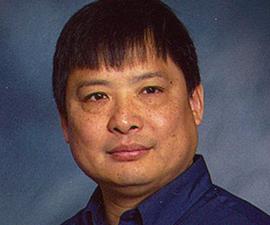

Research Expertise and Interest
applications of artificial intelligence and machine learning in engineering and sciences, structural mechanics, computational mechanics, computational materials, computational mechanics and computational physics, finite element methods and meshfree particle methods, ferroelectric and piezoelectric materials, atomistic simulation and multiscale simulations, nonlinear continuum mechanics, soft matter mechanics, wave propagations, modeling and simulation of fracture, dislocations, modeling and simulation of material failures, nano-mechanics, bio-mechanics and bio-physics, cellular mechanics, micromechanics & composite materials, mechanics and physics of amorphous materials
Research Description
Shaofan Li is a professor of Applied and Computational Science in the Department of Civil and Environmental Engineering. Professor Li's current research interests are computational nano-mechanics and multiscale simulations, computational statistical physics, soft matter physics and mechanics of colloidal, biomechanics, in particular, cell mechanics. In specific, Professor Li and his research group have been working on the following research topics:
- Developing machine learning and artificial intelligence-based methods for engineering and scientific applications such as 3D printing and additive manufacturing, inverse problems, autonomous driving, etc.
- Developing computational failure mechanics methods to model and simulate material and structure failures. In particular, Professor Li's group has been developing novel methods in nonlocal peridynamics and novel phase-field methods to model fracture and crack propagations
- Atomistic and multiscale modeling and simulations of dislocation dynamics, dislocation pattern dynamics, and crystal plasticity. In particular, Professor Li's group has been developing multiscale machine learning methods to model crystal plasticity.
- Computational multiscale modelings of soft matters; Soft matter mechanics and cell mechanics. In specific, Professor Li's group has been developing novel soft matter cell models to simulate contact, adhesion, spreading, and motility of cells.
- Develop computational methods to model mechanical properties and failures of amorphous materials, such as polymers and polymeric materials in general.
- Using first-principles-based methods and molecular dynamics to study desalination, wastewater separation, and aerosol nucleation.
- Develop large-scale computational fluid dynamics methods to simulate virus pathogen transmission and other transmission mechanisms of respiratory diseases, such as COVID-19.
- Developing particle methods to simulate geomaterial failures under high strain rate impacts and blast loads.
- Develop piezoelectric and piezomagnetic sensors for the interface of metaverse and universe, and
- Modeling and simulation of cementitious materials and developing self-healing and sustainable cement materials.
Some examples are:
- Multiscale simulation of brittle-to-ductile transition in amorphous materials and model polymeric materials in 3D printing.
- Developing machine-learning-based multiscale dislocation pattern dynamics method and simulating crystal plasticity.
- Study cell motility and mechanotransduction.
- Develop artificial intelligence-based design methods for marine and aerospace structures.
- Meshfree particle simulation of failure of marine structures.
- Atomistic and multiscale modeling and simulations of cementitious materials.
- Probabilistic and intelligent estimation modeling of material and structure fatigue.
- Design nano-machine for desalination and wastewater cleaning and separation.
- Develop novel peridynamics and phase-field methods to simulate fracture in solids.
- Modeling and simulation of dentritic growth and failure of battery materials.
- Developing machine learning methods for inverse forensic analysis of car accidents, and
- Develop AI-based machine learning methods to predict wildfire.